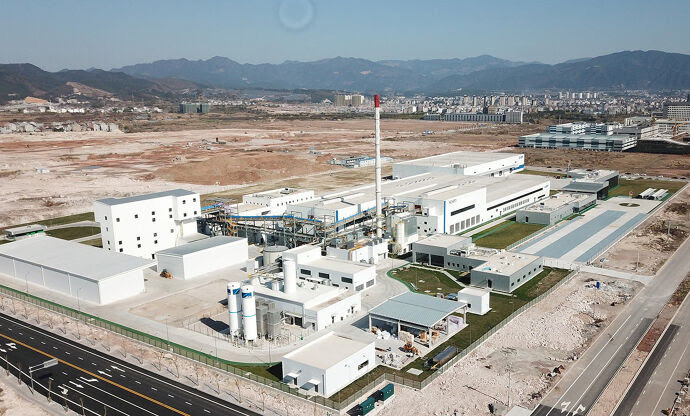Specialty glass manufacturer SCHOTT celebrates the official opening of its new factory in Jinyun, China. The production, which went into operation end of 2020, is manufacturing high-quality borosilicate glass tubing – the highly sought after base material to produce e.g. vials and syringes for COVID-19 vaccines. With an initial capacity of 20,000 tons of glass and room for further expansion, the plant is functioning as a production and supply hub in the region. SCHOTT has invested 60 million Euros in the new plant as part of a 1 billion USD investment to expand its global pharmaceutical business.
Building a melting tank for high-quality pharma glass tubing requires extraordinary skills. Despite the pandemic, a team of German and Chinese experts managed to complete the construction of the factory in record-breaking “China speed” of just 15 months. “Of course, our glass stands at the very beginning of an ambitious value chain. But it´s one piece of the bigger picture: Turning the vision of “Healthy China 2030” into reality. We’re very proud that it also marks the first time that SCHOTT is melting glass in China,” says Dr. Frank Heinricht, Chairman of the Management Board of SCHOTT.
“As the most modern tubing production site worldwide, it is equipped with state-of-the-art manufacturing technology. Through our local glass production, we enable a faster and improved supply chain that will subsequently help to improve packaging quality,” adds Dr. Patrick Markschläger, Executive Vice President of SCHOTT’s Business Unit Tubing. With the help of big data and artificial intelligence, each tube is inspected 100 percent based on the company’s perfeXion® process, which is also in place in SCHOTT’s other pharma tubing manufacturing sites.
The industry gold standard
Borosilicate glass, known under the SCHOTT brand name FIOLAX®, has been the preferred choice of material for pharmaceutical packaging since the company’s founder Otto Schott first developed it around 1890. The highly inert glass protects drugs from unwanted drug-container interactions, making it an ideal packaging material for life-saving drugs. More than 90% of all approved COVID-19 vaccines rely on SCHOTT’s glass tubing.
The manufacturing site will support the move away from the low borosilicate glass (so called 7.0 glass type) to the higher quality middle borosilicate glass (so called 5.0 glass type), which is already well established globally.

With an initial capacity of 20,000 tons of 5.0 Type I borosilicate glass, the tubing plant will help take the pharma industry to the next level. Image: SCHOTT
Pioneering – responsibly – together.
These attributes characterize SCHOTT as a manufacturer of high-tech materials based on specialty glass. Founder Otto Schott is considered its inventor and became the pioneer of an entire industry.
Always opening up new markets and applications with a pioneering spirit and passion – this is what has driven the #glasslovers at SCHOTT for more than 130 years. Represented in 34 countries, the company is a highly skilled partner for high-tech industries: Healthcare, Home Appliances & Living, Consumer Electronics, Semiconductors & Datacom, Optics, Industry & Energy, Automotive, Astronomy, and Aerospace. In the fiscal year 2020, its 16,500 employees generated sales of 2.24 billion euros. With the best teams, supported by the best digital tools, the group intends to continue to grow. SCHOTT AG is owned by the Carl Zeiss Foundation, one of the oldest foundations in Germany. It uses the Group's dividends to promote science. As a foundation company, SCHOTT has anchored responsibility for employees, society and the environment deeply in its DNA. The goal is to become a climate-neutral company by 2030.

